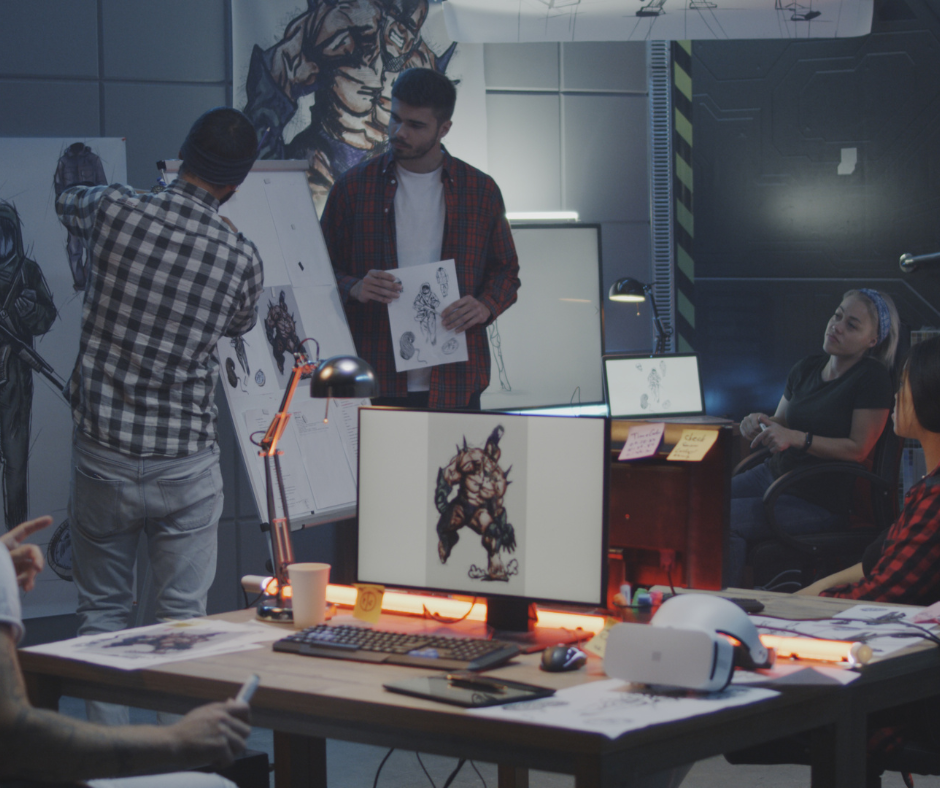In today’s tough job market, especially with high unemployment rates in South Africa, finding a stable and fulfilling career is more important than ever. Many people are looking for paths that not only offer job security but also bring satisfaction and excitement to their lives. One such promising field is game design. In our article, “10 Reasons Why You Should Study Game Design,” we highlight how this innovative career can provide both financial stability and creative fulfillment. Dive in with us to discover why game design might be the perfect choice for you in these challenging times.

Career
What is Game Design?
Game design is the art and science of creating interactive experiences that entertain, educate, and engage players. It encompasses everything from storytelling and character development to level creation and gameplay mechanics. The impact of game design is vast, influencing not only the entertainment industry but also education, healthcare, and beyond. Games have the power to bring people together, foster creativity, and even solve real-world problems.
Reasons to Study Game Design
1.Creative Freedom
Game design allows you to bring your imagination to life by creating unique game worlds, characters, and stories. You can experiment with different genres, art styles, and gameplay mechanics to craft a truly original experience.
Example: Designing unique game worlds and characters allows you to bring your imagination to life.
2.Growing Industry
The gaming industry is expanding rapidly, creating a wealth of job opportunities for skilled game designers. With advancements in technology and the increasing popularity of gaming, there’s a high demand for innovative and talented individuals in the field.
Example: The gaming industry is expanding rapidly, offering numerous career opportunities in companies like Ubisoft and EA.
3.Technological Skills
Studying game design helps you develop important technological skills, such as programming, 3D modeling, and animation. These skills are not only essential for game development but also highly transferable to other tech-related fields.
Example: Learning programming languages like C++ or Python enhances your tech proficiency, applicable in various fields.
4.Collaborative Environment
Game design often involves working in teams, collaborating with artists, writers, and other developers. This collaborative environment helps you build strong communication and teamwork skills, which are valuable in any career.
Example: Working with artists, writers, and developers on a game project hones your teamwork skills.
5.Problem-Solving Abilities
Designing games requires strong problem-solving skills. You’ll need to create engaging challenges and puzzles for players, as well as troubleshoot and optimize game mechanics during development.
Example: Creating challenging puzzles and levels improves your analytical thinking and strategic planning.
6.Cultural Impact
Games have a significant cultural impact, influencing millions of people around the world. As a game designer, you have the potential to create experiences that resonate with players and leave a lasting impression.
Example: Games like Minecraft and The Sims have become cultural phenomena, influencing millions of players worldwide.
7.Interdisciplinary Learning
Game design is an interdisciplinary field that combines elements of psychology, storytelling, art, and computer science. This provides a well-rounded education and helps you develop a diverse skill set.
Example: Game design incorporates elements of psychology, storytelling, art, and computer science, offering a well-rounded education.
8.Entrepreneurial Opportunities
The rise of indie game development has made it possible for individuals to create and distribute their own games. This entrepreneurial aspect of game design allows you to start your own studio or launch games on platforms like Steam.
Example: Indie game development allows you to start your own studio or launch games on platforms like Steam.
9.Community Engagement
The game design community is vibrant and supportive, with numerous opportunities for networking and collaboration. Participating in game jams and joining online forums can help you connect with like-minded individuals and grow your skills.
Example: Joining game development communities, such as game jams, fosters networking and idea exchange.
10.Personal Fulfillment
Creating games can be deeply rewarding. Seeing players enjoy and connect with your game provides a profound sense of accomplishment and joy, making all the hard work worthwhile.
Example: Seeing players enjoy and connect with your game provides a deep sense of accomplishment and joy.
We hope the reasons above will make you consider game design as your career because it will change your life. Visit our website to get the best academic results that will allow you to study at the university of your choice.

